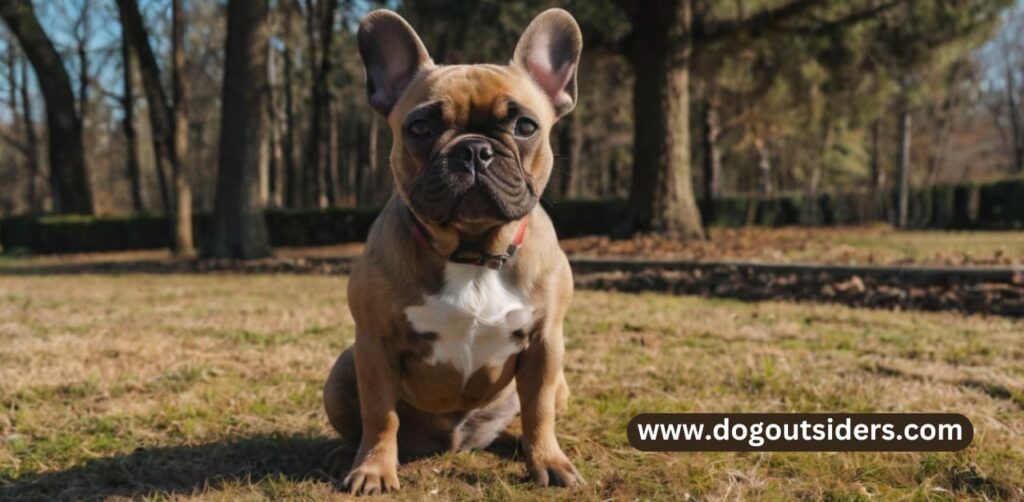Can Frenchies be outside dogs? From exercise needs to temperature tolerance, owning a Frenchie comes with considerations. Let’s explore the feasibility of having French Bulldogs as outdoor companions. Frenchies, known for their affectionate nature, might surprise you with their adaptability to outdoor environments. Understanding their specific traits is key to deciding if they can be happy and healthy outdoors. Join me in uncovering whether these adorable pups can embrace the great outdoors without missing the comforts of indoor living and becoming an outside dog.
Key Takeaways
- Understand the specific needs and characteristics of French Bulldogs to assess their suitability for outdoor living.
- Consider the health implications of exposing Frenchies to outdoor environments, including temperature sensitivity and respiratory issues.
- Provide adequate shelter and comfort for French Bulldogs outdoors, ensuring they have a safe and cozy space.
- Protect your French Bulldog from extreme weather conditions by offering appropriate cover and ensuring they stay comfortable.
- Ensure proper hydration for your Frenchie when outdoors, especially in hot weather, to prevent dehydration.
- Encourage regular exercise and social interaction for your French Bulldog to keep them healthy and happy while living outdoors.
Can Frenchies Be Outside Dogs?
Frenchies are not well-suited to being outside dogs due to their brachycephalic (short-nosed) anatomy. They are sensitive to temperature extremes, especially heat, and can easily overheat in hot weather. French Bulldogs also have a tendency to develop respiratory issues, which can be exacerbated by excessive heat and humidity. Frenchies are companion dogs that thrive on human interaction and are happiest when they are inside with their families. It is best to provide them with a comfortable indoor environment where they can stay cool and safe.

Top Reasons Frenchies Are Not Well-Suited to Being Outside Dogs
French Bulldogs, or Frenchies, are not well-suited to being outside dogs for several reasons. Firstly, their short snouts make them prone to overheating in hot weather, leading to potential heatstroke. Additionally, their compact build and short coat provide little insulation against cold temperatures, making them susceptible to hypothermia in chilly conditions. Furthermore, Frenchies are a brachycephalic breed, meaning they have difficulty regulating their body temperature and may struggle to breathe properly in extreme weather conditions. Overall, these factors make French Bulldogs better suited to indoor living where the temperature can be controlled and monitored for their well-being.
Understanding French Bulldogs
Distinctive Features
French Bulldogs, known as little frenchies, are easily identified by their distinctive bat-like ears, wrinkled faces, and compact muscular bodies. These features give them a unique and adorable appearance that sets them apart from other dog breeds. Frenchies are compact yet sturdy, making them suitable for both apartment living and larger homes.
Temperament and Behavior
French Bulldogs are renowned for their affectionate and playful nature. They are also characterized as easygoing companions, making them ideal pets for families, singles, and seniors alike. Their friendly demeanor and adaptability make them a popular choice among dog lovers seeking a loyal and loving companion.
Historical Background
The history of French Bulldogs traces back to the 1800s when they were developed in England. The breed emerged as a result of crossing English Bulldogs with local ratters in France. This crossbreeding led to the creation of a new dog breed with distinct characteristics, including the signature bat ears that have become synonymous with Frenchies.
I find that French Bulldogs are not just pets; they are cherished members of the family due to their loving nature and playful antics. Their unique appearance and friendly disposition make them stand out among other small dog breeds. Their adaptability to various living situations, from apartments to larger homes, makes them versatile companions for individuals from all walks of life.
Evaluating Outdoor Suitability

Body Structure
French bulldogs’ physical characteristics, such as their short muzzles, pose challenges for them to thrive as outside dogs. Due to their brachycephalic nature, they struggle to regulate body temperature effectively. This limitation makes them more prone to heatstroke and other heat-related issues. The breed’s inability to cool down efficiently in hot weather makes it risky for them to be outdoor pets.
Coat and Leg Length
The short coat of French bulldogs provides minimal protection against extreme temperatures, making them susceptible to hypothermia in cold weather. Their short legs and proximity to the ground expose them to various elements when outdoors. These factors contribute to their discomfort in harsh weather conditions, reinforcing their unsuitability for prolonged outdoor living.
Historical Context
While Frenchies were initially bred as ratters and used to spend time outdoors, changes in their physical attributes have shifted their suitability towards indoor living. Over time, breeders focused on enhancing specific traits, resulting in a shift from being primarily outdoor dogs to more indoor-oriented companions. This transition highlights the importance of understanding the evolution of dog breeds and how it impacts their lifestyle needs.
In my experience, I have seen firsthand how French bulldogs struggle in extreme weather conditions when kept outdoors for extended periods. Their tendency to overheat quickly, like a dog, underscores the significance of providing them with a comfortable indoor environment. Observing their discomfort during outdoor activities further emphasizes the importance of considering their well-being when determining their living arrangements.
Health Considerations

Risks of Hypothermia
Frenchies, like any dog, are vulnerable to hypothermia when left outside, especially in freezing temperatures. Owners must be cautious due to their sensitivity to cold weather.
Monitoring Signs
Watch out for signs of hypothermia such as trembling, lethargy, and slow breathing in French bulldogs. These symptoms indicate a serious health risk.
Immediate Action
If you observe any symptoms of hypothermia in your French bulldog, take swift action. Seek veterinary care promptly to ensure your pet’s well-being.
Shelter and Comfort
Warm Crates
Provide French bulldogs with warm crates or beds to ensure their comfort during cold weather. Companion animals like Frenchies benefit from having a cozy space to retreat to when temperatures drop. Consider adding soft blankets or cushions for extra warmth.
Protective Clothing
Consider dressing Frenchies in protective clothing like onesies and winter jumpsuits for added warmth. These outfits can provide an additional layer of insulation, especially during chilly days or nights. Ensure the clothing fits well and does not restrict their movement.
Cozy Indoor Environment
Create a cozy indoor environment for French bulldogs to retreat to when temperatures drop. Pets like Frenchies appreciate having a warm and secure place inside, away from harsh weather conditions. Provide them with access to a comfortable spot where they can rest peacefully.
I find that using a warm dog bed with plush bedding helps my French bulldog stay cozy during the colder months. Investing in a heated pet mat can provide extra warmth, especially for older dogs or those with joint issues. Ensuring that the indoor temperature is kept at a comfortable level is essential for the well-being of your furry companion.
Personal Experience:
When my French bulldog was a puppy, I noticed that he shivered when exposed to cold drafts. Investing in a thermal dog coat made a significant difference in keeping him warm and comfortable during our outdoor walks. Providing him with a designated indoor resting area, complete with his favorite toys and blankets, also helped him feel safe and secure.
Weather Protection

Potty Pads
Limit Frenchies’ time outside in cold climates by using potty pads indoors. This helps protect them from extreme temperatures and potential health issues.
Waterproof Dog Boots
Invest in waterproof dog boots to shield French bulldogs’ paws from snow and ice during walks. These boots provide insulation and prevent frostbite.
Cooling Clothes and Mats
Utilize cooling clothes and mats to help French bulldogs stay comfortable in hot weather. These items regulate their body temperature and prevent overheating.
I always make sure to limit my French bulldog’s time outside during winter, especially in cold climates. Using potty pads indoors has been a lifesaver, protecting my furry friend from the harsh weather. Investing in waterproof dog boots has kept my Frenchie’s paws safe during snowy walks.
Cooling clothes and mats have also been a game-changer for keeping my French bulldog comfortable during hot weather. They help regulate his body temperature and prevent him from getting too hot. It’s essential to prioritize your pet’s comfort and well-being in all weather conditions.
Ensuring Proper Hydration
Fresh Water Availability
French bulldogs, like all dogs, require access to fresh water at all times, especially when they are outside. Dehydration can quickly become a concern, particularly in hot weather conditions. It’s essential to ensure that your French bulldog has constant access to clean water to prevent any health issues related to dehydration.
Monitoring Water Intake
Monitoring your French bulldog’s water intake is crucial, especially during periods of high outdoor temperatures. Dehydration can be exacerbated by the heat, making it even more important to keep track of how much water your dog is consuming. Signs of dehydration include lethargy, dry gums, and sunken eyes.
I always make sure to check my French bulldog’s water bowl frequently, especially when we are out for walks or spending time outdoors. Observing their behavior and ensuring they are drinking enough water helps maintain their health and well-being.
Stainless Steel Water Bottles
Consider using stainless steel water bottles specifically designed for French bulldogs when you are on the go. These bottles are convenient for providing water during walks or outings. They are durable, easy to clean, and often come with features like leak-proof seals and attached bowls for easy drinking.
I find that having a designated water bottle for my French bulldog ensures that I can easily offer them water wherever we are, whether it’s at the park or on a road trip. It gives me peace of mind knowing that my furry friend stays hydrated and healthy throughout our adventures.
Exercise and Social Interaction
Indoor Activities
Engage French bulldogs in indoor exercises to ensure they meet their activity requirements. Play sessions can include interactive toys like ropes or balls, promoting physical health and mental stimulation.
Incorporate puzzle toys into their routine to keep them entertained and mentally sharp. These activities not only provide physical exercise but also engage their cognitive abilities, ensuring a well-rounded approach to their overall well-being.
Socialization Opportunities
Arrange playdates with other dogs to encourage social interaction for Frenchies. Socialization is crucial for their mental health and helps prevent boredom. Regular interactions with other dogs can enhance their communication skills and reduce anxiety.
Provide opportunities for your French bulldog to interact with different people and environments. This exposure helps them become more adaptable and confident in various situations, contributing to their overall social development.
Regular Check-ups
Veterinary Visits
Schedule routine veterinary check-ups to monitor French bulldogs’ overall health and well-being. Regular visits help in detecting any health issues early on, ensuring timely treatment. Vaccinations and parasite control are crucial aspects of these check-ups.
Consulting with a veterinarian experienced in treating French bulldogs is essential for their well-being. Stay updated on the necessary vaccinations to protect them from common diseases. Discuss dental care routines to maintain their oral health.
Health Monitoring
Keep track of your French bulldog’s weight and dietary habits. Monitor their activity levels and behavior for any changes that might indicate underlying health problems. Maintain records of their vaccinations and medical history for reference.
Observing any unusual symptoms such as lethargy or loss of appetite can provide early indications of potential health issues. Act promptly by seeking professional advice if you notice any concerning signs. Regular monitoring ensures your furry friend’s continued good health.
Tips for Outdoor Living
French Bulldogs and Outdoor Environment
French bulldogs, known for their unique physical characteristics, are not suitable as outside dogs. Their short snouts make them prone to breathing difficulties in hot weather. Their thin coats offer little protection from extreme temperatures.
It is essential to understand that Frenchies are companion animals that thrive on human interaction and indoor comfort. They enjoy being close to their owners and can suffer from separation anxiety if left alone for extended periods.
Indoor Living Arrangements
Creating a cozy indoor environment is crucial for the well-being of French bulldogs. Ensure they have access to a comfortable bed, fresh water, and a designated area for meals. Consider using pet-safe heating pads during colder months.
When it comes to outdoor activities, opt for supervised walks and playtime in secure areas. This allows Frenchies to enjoy the outdoors while ensuring their safety and preventing them from wandering off or encountering potential hazards.
Safety Measures for Outdoor Play
When engaging in outdoor activities with your French bulldog, always prioritize their safety. Use a harness instead of a collar to prevent neck injuries and provide adequate shade and water during hot weather. Keep an eye out for signs of overheating, such as excessive panting or drooling.
Remember that French bulldogs are sensitive to extreme temperatures, so avoid exposing them to prolonged heat or cold. Monitor their behavior closely during outdoor play to ensure they are comfortable and not experiencing any distress.
Conclusion:
After considering all aspects of owning a French Bulldog as an outdoor pet, it’s evident that with proper care and attention, these adorable pups can thrive outside. Health, shelter, hydration, and social interaction are key factors to keep in check for their well-being. Regular vet check-ups and following the provided tips for outdoor living are essential for a happy and healthy Frenchie. By ensuring they have the right setup and care, you can create a fantastic environment for them to explore and play in. Let’s give our Frenchies the best of both worlds – indoor comfort and outdoor adventures!
FAQ’s:
French Bulldogs are brachycephalic breeds, making them sensitive to extreme temperatures. While they enjoy short outdoor activities, they should not be outdoor dogs due to their breathing issues and susceptibility to heatstroke.
Frenchies need protection from extreme temperatures, adequate hydration, and UV exposure management. Regular vet check-ups are essential to monitor their health and detect any issues early on.
Provide a comfortable shelter with proper bedding, access to shade, and water. Avoid leaving them outside unsupervised for extended periods and pay attention to signs of discomfort or distress.
Protect your Frenchie from both heat and cold by providing appropriate shelter, limiting sun exposure during hot days, and using protective clothing in colder weather. Monitor them closely for any signs of discomfort.
Yes, French Bulldogs are prone to dehydration due to their small size and activity levels. Always provide fresh water in a clean bowl, especially during hot weather, to prevent dehydration and maintain their health.
Frenchies benefit from regular social interaction and moderate exercise outdoors to stay mentally and physically healthy. Engage in interactive play sessions and short walks to keep them active and stimulated.
Ensure a safe environment, provide proper shelter, monitor their health closely, offer regular exercise and social interaction, maintain hydration levels, and schedule routine vet check-ups. Prioritize your Frenchie’s well-being and safety in all outdoor activities.






